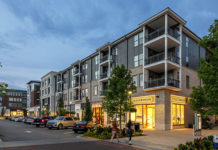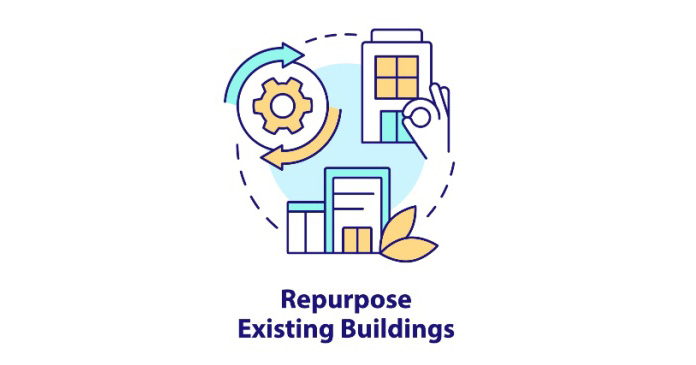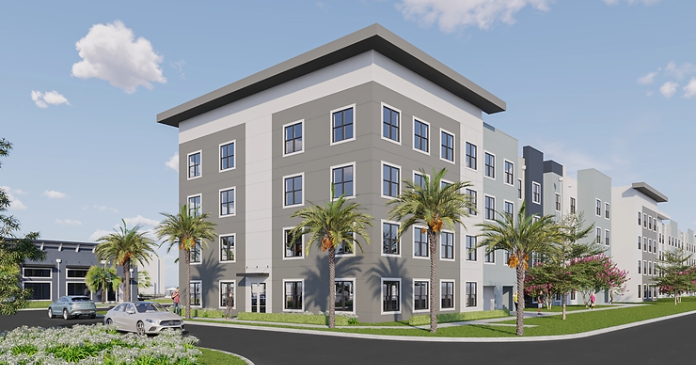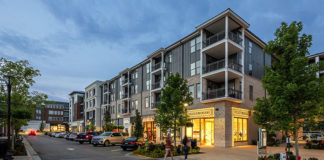Apartment renters are increasingly picky about the internet in their homes. A growing number won’t live where they can’t get good service.
Until recently, property managers didn’t have to worry about the internet service at their properties.
Residents arranged their own internet connections. Whether the service was fast or slow—or simply not available for the day—property managers had nothing to do with it. The most they could provide was a sympathetic ear to residents fed up with non-existent service.
That’s changing. Just as residents learn to value reliable, fast internet service more than ever before, a growing number of properties managers are providing that service. Some are just providing internet service to residents in the common areas of their communities. Others are partnering with technology companies to provide high-speed service to residents who sign up for the service in every corner of their apartment properties.
Strong, wireless internet solves problems from the range from cell phone service to the challenge of connecting with smart apartment gear like the electronic locks needed for self-guided tours.
The availability of fast, reliable internet service also helps property managers rent apartments.
“The availability of fast, reliable internet is of immense value to renters today,” says Paula Munger, assistant vice president for industry research and analysis for the National Apartment Association, based in Arlington, Va.
Renters need reliable internet
Apartment residents learned during the coronavirus pandemic how important fast internet service can be.
“Multiple surveys and studies show just how much high-speed internet and WiFi mean to residents and factor into their search for an apartment home,” says Joel McIntyre, CEO of GiGstreem a technology company with offices in New York City.
Fast, reliable internet service inside their apartment is one of the features residents desire most, according to a recent survey of renter households by NAA. The only amenity rated more highly was a washer and dryer in their unit.
A few renters go even further: one-in-six (15 percent) say fast, reliable, wireless internet in their apartment is the feature they desire more than any other, according to a recent survey by Apartment Guide. That’s especially true for young renters. Generation Z and millennial respondents were 40 percent more likely to prioritize faster internet connections than older generations, according to the survey.
“Reliable, fast internet service is paramount to the next generation of renters,” says NAA’s Munger.
At apartments properties where residents can sign up for fast internet service, property managers make sure potential renters know.
“Communities often place these top-ranking amenities, for instance strong in-unit and community WiFi, in prominent places on their marketing materials, namely their website, social media and handout materials for their leasing office,” says Munger.
Some renters are willing to pay an internet service provider more for faster service. However, renters overall have not proven that they are willing to pay more in their base rent just to live in an apartment where that fast service is available, according to data and analysis from CoStar.
“While upgrades to internet connectivity will be valuable to a select group of renters, differences in connectivity may not be noticeable to more casual network users,” says Andrew Rybczynski, managing consultant for CoStar.
Renters continue to work from home
For many renters, fast, reliable internet service may be a little like hot, running water. Most of the time, they take it for granted. But they notice immediately when cold water pours out of the showerhead—or when a video call freezes up with an employer or a client—either because an inefficient system has failed or because heavy use has pushed the system too far.
For millions of renters, the pandemic exposed the strength—or the weakness—of their internet service. Many were confined to their homes for all but the most urgent errands, with internet as their main lifeline to the outside world.
“Apartment homes transformed. They became offices, daycares and more, serving many of the essential functions of daily life,” says NAA’s Munger.
Most students received their education at home though video. Many also used the internet to do most of their shopping, in addition to watching hundreds of hours of movies and videos.
Offices and businesses also closed, forcing many to work online—more than half (56 percent) according to research by Yield PRO magazine and Dish Fiber.
“The start of the pandemic and subsequent stay-at-home orders saw a majority of our residents shift from working in-office to telecommuting,” said Emelyna Aurich, director of property management for Cordish Living, working in the firm’s offices in Kansas City, Mo.
A single apartment resident with relatively slow internet service of just 50 megabits per second can probably join a video call, binge watch hours of television or surf the internet without noticing their supposedly slow internet connection.
But the service can freeze up when more than one person tries to use the connection at the same time for tasks like sending and receiving video, or when the network is overwhelmed by traffic in its area.
Many large internet service providers don’t guarantee quality—only promising speeds up to a certain level. The speed of the service they provide may sometimes drop far below those top speeds, depending on whether the signal in their neighborhood is carried on modern fiber optic cable, DSL networks or old-fashioned copper wire.
Long after the pandemic is over, many apartment dwellers will still require fast internet service. Many are likely to continue to work from home at least part of the time.
“I think we’ll continue to see a mix of telecommuting and working in-office,” says Aurich. “While we’ve seen some of our residents make a full return to working in-office, we’ve also spoken with many residents who say their employers are shifting to a mixed schedule— with some even making a full-time move to telecommuting.”
The desire for fast internet service is also likely to continue to increase—as it has over the last 20 years.
“With more and more technology advancements, more connected devices, more streaming services, and more digital needs, the demand for fast, reliable internet and WiFi will continue to grow exponentially,” says McIntyre.
New certification for internet/cell
Apartment buildings are now being publicly rated on their connectivity. Beginning in June 2021, Wired Score, a technology company with offices in New York City, began to certify apartment properties in the U.S., based on the quality of the internet service available and the cell phone service. That includes speed, reliability and the number of choices that customers have available to them.
Property owners who participate pay to have Wired Score visit their property to sample its services and assess whether the property can accommodate future technologies. Qualifying properties earn a WiredScore certification—higher-performing buildings earn silver, gold or platinum certifications.
Office tenants are already willing to pay more rent for better internet service, as certified by Wired Score. High Wired Scores in office properties correlate with higher rents and higher rent growth than comparable properties, according to CoStar’s analysis of data from 2017 to 2020.
Internet-enabled common areas
Even before the pandemic, a growing number of property managers already provided fast, internet service in many common areas, especially at new or newly-renovated, luxury buildings.
“Many of our communities already have lounges with free WiFi, areas for working, coffee, etc.,” says Karen Hollinger, senior vice president of strategic initiatives for AvalonBay Communities.
“Reliable outdoor WiFi is a must,” said David Scharfenberg, senior vice president of operations for Waterton, based in Chicago. “During the pandemic and today we have many residents finding outdoor spaces where they can work or attend classes. Work-anywhere is great, but only when you can count on your WiFi connection.”
More and more residents are using common areas for work. “With work-from-home continuing into the summer, we are seeing more and more residents taking advantage of shared amenity spaces as satellite work areas to help diversify the at-home work environment,” said Louis DeVos, vice president of Property Management at Woodmont Properties.
Woodmont responded by providing more common areas where the WiFi signal is strong. It is also providing a greater variety of seating areas with laptop and tablet space, and smaller breakout options or huddle spaces where teams of people can easily meet,” sais DeVos.

Property managers partner
A growing number of apartment owners have partnered with technology firms like Dish or Gigstreem to provide fast, reliable internet service at their properties.
Building-wide wireless internet service is one of the most desirable, community-wide amenities that an apartment property can provide, second only to reserved parking, according to NAA’s Munger.
The real estate investment trust (REIT) Essex Properties began to offer high-speed, wireless internet in June 2021 to the residents at three properties. Essex partnered with Gigstreem, which is building the fiber-optic infrastructure. Residents have the option to continue to use their existing internet provider, though in the first weeks, 10 to 15 percent of the residents had already signed up, matching the REITs expectations, according to Essex. Another 30 Essex properties will offer the service in the following months.
“We started at properties where they service wasn’t as fast,” says Patrick Klein executive vice president and chief technology officer for Essex. The service will function much like the wireless internet provided at many hotels, which penetrates the entire property.
Apartment companies can also benefit when they provide wireless internet service throughout their properties. It helps them operate technologies like electronic locks that are necessary to allow potential residents to take self-guided tours.
“While some had started considering self-guided tours and virtual tours prior to the pandemic, it became the only way to do business after the outbreak,” said Tina West, managing director and multifamily practice leader for CBRE’s property management business in the Americas. “Having options for virtual and in person tours is now expected.”
Self-guided tour technology allows potential residents to visit a property after the leasing office is closed by signing up through the website of the apartment community.
Once their identity is verified, electronic locks can allow prospective renters to enter and leave. An app on their phone can provide information about the apartment and the community and track them as they tour the property. All this works more smoothly if the building has its own wireless internet network—though property manager can also pay to install wireless routers to control electronic door locks and other smart-gear.
Fast internet solves bad cell service
Reliable, fast internet service can also solve another problem for apartment owners: bad cellphone service.
Student residents rank cell phone reception ahead of internet service, gyms, pools, and community clubhouses as their most important apartment amenity, according to a technology usage survey conducted by Houston-based J Turner Research.
Many younger renters rely on cellphones instead of traditional phone service. Some won’t even consider renting an apartment where they can’t make a call on a cellphone because of weak service. Property managers report that apartments with weak cell phone services are less likely to have their leases renewed by residents.
“Spotty cell phone reception can hurt renewal rates and new leases,” says McIntyre.
The problem with weak service is only getting worse for apartment properties that can’t provide a solution. Many garden apartment communities have cellphone dead patches where the signal from cell phone towers don’t reach. Older buildings also often have apartments where brick and concrete block out cellphone signals.
New 5G cellphone signals have even less power to penetrate these properties and can even be stopped by the tempered glass now common on newer mid- and high-rise buildings.
Residents with strong internet service can sidestep the problem, simply by setting their cell phones to allow WiFi calling, which allows the phone to place calls over an available wireless internet network, even in a place where there is no cellular service.
“The good news is that a well-designed and executed campus WiFi-network will support cellular calling and can fill the need,” says McIntyre.
Author Bendix Anderson















